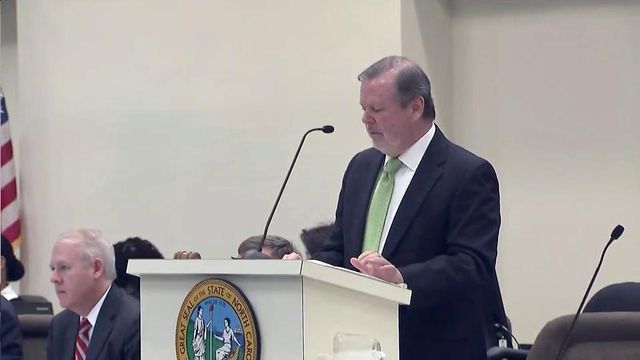Lawmakers press DHHS to move ahead with mental health mergers
Local mental health agencies have been told for years they need to merge with one another in order to survive. But DHHS Secretary Rick Brajer recently put such mergers on hold, sparking questions from the legislature.
Posted — Updated"I would simply ask that you ask the secretary to reconsider the pause," Sen. Fletcher Hartsell, R-Cabarrus, told David Richard, the state's Medicaid director, who stood in for his boss before the Joint Legislative Commission on Government Operations.
Nine Local Management Entities provide publicly-funded health care across North Carolina to people with mental illness, substance abuse issues and developmental and intellectual disabilities.
Two specific cases were raised during Wednesday's meeting. Cardinal Innovations, which services clients from Charlotte up through the Triangle, and CenterPoint, which is based in the Forsyth County area, have agreed to merge, but that has been put on hold by the department. As well, Hartsell asked about Nash County's plans to switch from Eastpointe to Cardinal.
"We would like to have the opportunity to decide, to make a choice of which organization will meet the needs of our most vulnerable citizens," said Lisa Barnes, a Nash County commissioner.
Senate President Pro Tem Phil Berger said the delays were having "real world consequences" and that counties like Rockingham and Nash had seen "the rug pulled out form under them."
For example, Barnes told the committee that, after Nash County had announced it's intention to move to Cardinal, Eastpointe announced it would scale back transportation services funding for patients from the county.
Richard stressed that the department wasn't saying no to the mergers or imposing a moratorium.
"I would characterize it as taking our time," he said.
Richard's answer didn't sit well with Berger, R-Rockingham. He asked Richard when the department would begin to approve mergers again. Richard did not give a definite answer, asking for time to confer with Brajer. He did note that Brajer's memo mentioned "early summer" and that the department had to create a draft reform plan by March 15.
"So, it looks like we're looking at maybe March, definitely by June?" Berger asked.
"I can't help but come to the conclusion that this is bureaucracy hamstringing the real world," he said, asking the department to provide lawmakers with a more definitive timeline of when mergers might be allowed again.
Related Topics
• Credits
Copyright 2024 by Capitol Broadcasting Company. All rights reserved. This material may not be published, broadcast, rewritten or redistributed.






